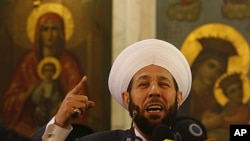The human rights group Amnesty International is calling on Middle Eastern governments to provide the kind of real reform their populations are demanding, and says governments elsewhere should be more supportive of those who are demonstrating and dying for freedom.
Amnesty International says violence and repression will continue in the Middle East unless governments in the region, and major powers outside it, “wake up” to what the people really want.
In a report issued Monday, Amnesty says governments have not recognized the scale of change that people want, and that those demanding change will not be deterred by state violence. Philip Luther is Amnesty’s interim director for Middle Eastern affairs. “We want governments to understand that everything has changed and it’s clear that protest movements across the Middle East and North Africa have clearly shown that they will not be dissuaded, that they will not be intimidated, from carrying out their struggle for dignity and for justice.”
The report says gains made through the protests and revolutions have mostly not been formalized through laws and constitutional changes. And in some countries, notably Egypt, security forces have been as brutal as they were before the revolution, and in some instances worse.
For that reason, Luther says the West needs to be careful how it deals with both emerging and old governments in the region, particularly regarding arms sales. “There can’t be a return to business as usual. There can’t be a return when fundamental reforms have not happened. We need to see people learn the lessons of the past,” he said.
Amnesty also says foreign powers have “failed to grasp the depth of the challenge to entrenched repressive rule” in the Middle East.
It notes the foreign support for the uprisings in Egypt and Libya, but criticizes the relative lack of international action on Syria and Bahrain. The report also calls the response by the Arab League, the African Union and the European Union “inconsistent.”
Luther criticized what he called the “negative role” of Saudi Arabia and Iran, and the decisions by Russia and China to block stronger United Nations action on Syria.
Even in Tunisia, where Amnesty has a good relationship with the new president, a former political prisoner, the organization says reform has not come quickly enough.
| Join the conversation on our social journalism site - Middle East Voices. Follow our Middle East reports on Twitter and discuss them on our Facebook page. |




